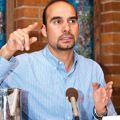Something unsettling is happening when conscience becomes a dirty word in a liberal democracy. Yet most Canadians seem unfazed by the increasing tendency to treat our fundamental right to freedom of conscience as if it were some unspeakable anti-social offence.
The denial of conscience rights to marriage commissioners in Saskatchewan, the obliteration of parental rights in Quebec, the imposition of state sexual ideology on Catholic schools in Ontario — these should all be causing deep concern. In none of these cases, after all, have the aggrieved parties taken the law into their own hands. They have not shouted fire in a crowded theatre, the time-honoured test of the limit of free speech. All they have sought is their Charter-protected right to be exempted from legal or regulatory obligations that violate their deepest and most sincerely held beliefs.
When he turns 85 on April16 Pope Benedict XVI will be just the sixth pope to reach that milestone age and the oldest pontiff in 109 years. Last month, the Pope warmly told former Cuban president Fidel Castro, who is eight months Benedict’s senior, “Yes, I’m old, but I can still carry out my duties.”
Benedict was described as a transitional figure when he became pontiff seven years ago. He was 78. It had been 300 years since the Vatican welcomed a new pope that old. But although less robust than on the day he ascended the throne of Peter, Benedict is still keeping a busy schedule and serving the Church with faith and distinction. Some transition.
The Canadian Conference of Catholic Bishops (CCCB) recently issued a statement saying they are “extremely disappointed” with the news that the Canadian Catholic Organization for Development and Peace had its latest government funding come in much lower than expected.
I for one couldn’t be happier.
Well, actually, I would be happier if D&P lost all of its government funding, but dropping from a request of $49 million over five years to just $14 million over five years is a step in the right direction.
When it comes to apologizing, Canadians need not be modest. Of course, we have competition because we live in a global village of apologies.
Australians have apologized to aboriginal peoples for having taken their land. Brits have apologized to half the world for colonialization. Canada has not only apologized for the experiment known as residential schools, but (at a cost of billions) has created a Truth and Reconciliation Commission, which is currently parading around the country hearing tales of abuse from both those who suffered and from those who recognize the sound of a bandwagon passing by.
Holy Week is not a particularly tranquil time for a priest.
In the midst of all the activity, I find Good Friday is the most resonant. My favourite service is actually extra-liturgical, the preaching of the Seven Last Words in our cathedral. It’s a two-hour service of readings, hymns and meditations, reflecting upon the seven times Jesus speaks from the cross. I have been preaching the Seven Last Words for nine years now, accompanied by the students at Newman House, who provide the music and do the readings.
The decision by the Ontario appeal court to legalize brothels is misguided but the judges got one thing right. They agree it is not their place to make laws and have urged Parliament to act.
On March 26, the court ruled that prostitutes have a Charter right to work in safe environments and therefore should be allowed to operate brothels and hire bodyguards. Pimping and public solicitation remain illegal but otherwise the court gave a green light to red lights.
There has been much fuss recently about ancient burial boxes and whether the bones of Jesus remain here on Earth.
In March, an Israeli antiquities collector was acquitted of forgery charges concerning a Roman-era burial box inscribed “James, son of Joseph, brother of Jesus.” If genuine, the ossuary could be a direct link to Jesus and His family.
And next week, Vision TV will air The Jesus Discovery, a documentary by Toronto filmmaker Simcha Jacobovici that claims to cast new light on the Resurrection. It bills itself as: “Part archeological adventure, part biblical history, part forensic science, part theological controversy, The Jesus Discovery is a story that will carry around the world.”
A Quebec legislative committee’s call for legalized euthanasia might be a grave danger to Canada’s health care system. Its immediate and unquestionable menace, however, is the damage it does to democracy.
For the moment, the Select Committee on Dying With Dignity’s all-party report presented March 22 to the province’s National Assembly is in parliamentary and pre-election limbo. There is reason to hope its mad demand for legalizing doctor-administered assisted suicide in Quebec by 2013 will be lost in the dust of politicians hitting the campaign trail.
The question arises because last June I wrote in this column that CCODP “has a tenuous claim on Catholic dollars because, aside from fundraising in Catholic parishes, they have a tenuous relationship with any distinctively Catholic mission. In their operations they are largely — and by their own proud design — indistinguishable from any number of peace and justice NGOs working in the developing world.”
The bishops of Canada take a different view and, in a March 22 statement, urged Catholics to redouble their generosity during the annual Share Lent campaign. In Kingston, our own archbishop sent a message to all parishes to that effect. I included it in my parish bulletin in the space usually reserved for my own message.
In a perfect world, agencies dedicated to lifting people out of poverty would be well financed with both private and public funds. But the world of 2012 is far from perfect so it should be no shock that Development and Peace is reeling from a 68 per cent cut in government funding.
Governments everywhere are scrambling to reduce huge budget deficits and ballooning debts exacerbated by global economic turmoil. In Canada, amid expensive national infrastructure and bailout programs, the Conservative government changed its approach to foreign aid in 2010. Where foreign aid used to be based on a percentage of GDP, it is now capped at $5 billion annually.
The issue of free speech on university campuses comes up almost every year. Over the past five years at least half-a-dozen student pro-life clubs have faced restrictions, outright bans or the threat of bans. Controversy around their speaking events, including the shutting down of speakers, is not uncommon.
In recent years presentations by conservative speakers have been cancelled or moved off campus due to “security concerns.” Meanwhile, pro-choice and other very liberal speakers are usually welcomed on the same campuses, suggesting the issue with conservative speakers is less about security than about their unpopular and presumably unwanted viewpoints.











